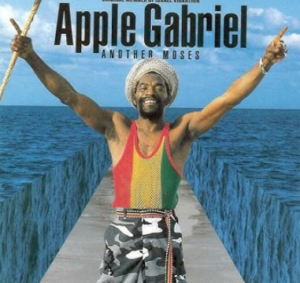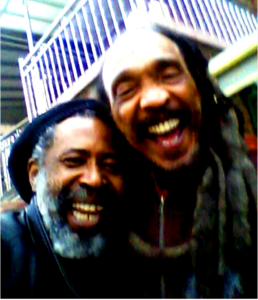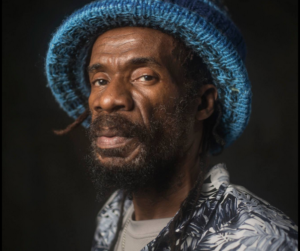By Ras Kefim
Photos: Facebook\YouTube Screenshots\Ras Kefim
The following article, by New York-based author and businessman Ras Kefim, talks about his friendship with Cecil “Skelly” Spence (above) of the legendary Israel Vibration Reggae group–whose three members have a compelling story of overcoming prejudices for their Rastafarian convictions–and for their inspirational battles against the polio disease they were diagnosed with as children. Ras Kefim is the author of the recently released book Deception In the Name Of the Lord. Read more about Deception In the Name Of the Lord in this Black Star News article.

“Skelly,” born Cecil Spence, 1952 in Kingston Jamaica, was one of three original members of the internationally known “Israel Vibration” Reggae group. Israel Vibration, along with so many others from the 70’s, left a lasting impression on the world because of the high quality music they created from their experiences of struggle. They blazed a trail of musical brilliance while never apologizing for their cultural convictions or expressions and they were tireless in their dedication to the “Roots and Culture” aspect of Reggae music.
Cecil Spence grew up in Kingston where he developed an early desire for the stage. According to this autobiographical sketch: “Spence was a member of the band Hot Lickers, appearing on Jamaican television with the group at the age of twelve.[1] He also played in the Jamaican wheelchair basketball team but was forced out in 1969 after adopting the Rastafarian faith, something which the three had in common when they were later reunited.” (Wiki)
The three Israel Vibration members, Spence (Skelly), Lascelle (Wiss) Bulgin, and Albert (Apple Gabriel) Craig met as polio victims at the Mona Rehabilitation Centre in St Andrew, Jamaica, during the late 1950’s. Poliomyelitis outbreaks gripped Jamaica at certain intervals in its history and left many affected among the population.

“It’s a part of Jamaican history which is not often recalled, two outbreaks of poliomyelitis in 1954 and again 1957 and mild cases in the 1980s, mostly in St James, which spared no one, irrespective of gender, race and class.” Polio: A hidden part of Jamaican history–Jamaica Gleaner
Israel Vibration first “came to prominence in 1978 with The Same Song, a single produced by Tommy Cowan calling for unity among the Rasta houses.” (edge105.com).
A year before was the big tune “Why Worry” (1977). This song was an attempt to address the insecurities some Rastas felt after Haile Selassie 1st transitioned in 1974.
I met Skelly, Wiss, and Apple in Brooklyn, in the mid 80’s, when, as I was told, they were abandoned by their then manager, Tommy McCowan, after coming from England where they performed under his management. They were in a desperate situation without adequate everything, living in a place not fit for comfort.

Over time they were able to gradually evolve from that stage, juggling producers until they signed with RAS Records. Some years later, in 2020, Apple died. But Skelly and Wiss continued on their musical missions.
Skelly, in spite of his situation, never tolerated and never make excuses because of his polio condition. He was a very independent man who did not see his situation with polio as an obstacle in pursuing his dreams and achieving goals. In so doing, he became an inspiration to his many fans locally and worldwide.

I posted this picture, above, on my Facebook page about four years before his passing, on August 26, 2022. This is a photo from a very unusual moment in time. It resulted from coming home, getting on Facebook, where to my surprise, I saw a post saying Skelly, from Israel Vibration had passed. I immediately exited my door and headed over to his house, about five blocks away. As I approached his house, I saw him putting out his garbage. I related what I saw on FB and this picture is a reflection of that moment.
That was then.
About a month, before he passed, Skelly was on the front burner of my mind. I hadn’t seen him for some time. After talking to someone, I was told he was home–sick.
The following day I went to see him. He was lying in bed. We talked and dug up a few memories from when we met decades before. But nothing was said about his health. And, I did not try to ask questions. We had a very mutually respectful relationship over many years, while he was living downstairs from my apartment, before he moved and later purchased his own house.
When leaving his house, on my last visit, he promised to send me Wiss’s contact number. That was the last time I spoke with Skelly. When I learn that he was in the hospital, and under what condition, the obvious was evident.
Skelly was a true and humble Rastaman, not a pussycat. He could be humorous. He laughed hard. But he didn’t appreciate certain jokes.
A signature memory, I have of Skelly, happened when I bought a Melodica. It took this hand-held keyboard to a band practice one day where Skelly was working on some songs for a solo album.
I had never played this instrument before, but I had seen Augustus Pablo play one and was always fascinated by it. I was a novice with the instrument. But, while sitting on the floor of the sound room, softly feeling out the keys, and trying to keep up with the notes in the song, I heard Skelly say, “who playing that sound, come up to the mike.”
Terrified, I shuffled up to the microphone. I struggled to maintain maneuvering the three notes to complete the song. And, for the first time, I played an instrument in a practice setting and it was with Skelly’s encouragement. It was also in the company of the African Roots Band, from Queens NY, now known as the African Roots Sound, with their manager Peter Campbell.
The story that began with Skelly and Israel Vibration in the 70’s: Three Rasta youths with polo disability, is a profile in strength, self-confidence, and cultural identity. Their coming together, their getting along with each other, after their meeting at a rehabilitation institution, and what happened on the way from childhood to now is one of the most amazing stories never told. And, it is doubtful if it can ever be fully told because of its scope.

The surviving member of Israel Vibration “Wiss” Bulgin, (above) operating out of Texas, is still presently on the road touring and performing.
I spoke to Wiss a week ago. He said he will be coming to the New York area sometime before the end of September, to early October, to do a few shows. As the last surviving member of the band, I am planning to do a sit-down interview with him and have some in-depth reasoning to get relevant information about the Israel Vibration story and experience.
Skelly and Israel vibration, as a group, are vibrant cultural icons. And because of their cultural value, we must preserve their legacy along with all the contributions from many others who made that same effort to, “Lift up your conscience,” Israel Vibration (1978).
Getting familiar with who Skelly was, off stage, gave me concrete evidence to the fact that in spite of our real, or assumed, disabilities in life we must still strive for progress and positive change. Even with the scars acquired through the journey, we must still find time to laugh and live life regardless of the challenges we face. Skelly and Israel Vibration brought musical joy and cultural awareness inspiring generations of lives across the globe.
Israel Vibration contributed much to the upliftment of Rastafari culture and Reggae Music. But, beyond their contributions to Rastafari, through music they brought the cause of millions with disabilities to the stage for the world to see. They did not crawl in a corner and cry ‘woe is me.’
Israel Vibration are truly, as the title of one of their album states, Unconquered People. They accepted their condition and took a positive attitude toward it. Their performances, from the streets of Kingston, to traveling to every continent of the world, displaying their talents to some of the largest audiences in the world, while dealing with all the difficult situations resulting from living with poliomyelitis, a crippling disease, is the inspirational gift that keeps on giving.

Ras Kefim, the author of Deception In the Name Of the Lord, is a New York-based author and business entrepreneur who through his various businesses (including being a master tailor and hat-maker) has done work for many local luminaries, particularly within the entertainment\cultural space. Ras Kefim can be contacted via e-mail at [email protected] or by phone at 1-347 369 8280.
Buy Deception In the Name Of the Lord






